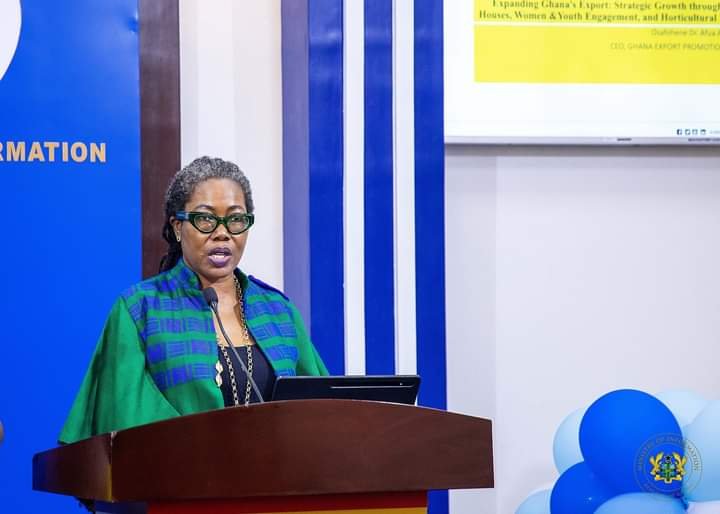
Dr. Afua Asabea Asare, GEPA CEO
The Chief Executive Officer (CEO) of the Ghana Export Promotion Authority (GEPA), Osafohene Dr. Afua Asabea Asare , has noted the significant strides her outfit has made through the “Youth in Export” programme to foster youth involvement in the country’s export sector.
Speaking during the Ministers’ press briefing in Accra yesterday, the CEO explained that the initiative, came at a crucial time when the country was diversifying beyond traditional exports like cocoa and gold.
Empowering next generation
Dr. Asare said that the initiative was designed to empower the next generation of exporters, and create sustainable employment opportunities for young Ghanaians, while providing them with hands-on experience and mentorship in various industries.
“The Youth in Export programme is a game-changer for our country. By investing in our youth, we are not only empowering them with the skills and knowledge needed to succeed, but also ensuring that Ghana’s export sector remains competitive on the global stage”, she emphasized.
She explained that the programme offered a six-month intensive mentorship, led by seasoned exporters. So far, two cohorts of young participants have successfully graduated from the programme.
“The first cohort, which focused on agribusiness, saw 20 young entrepreneurs launching their first exports, while the second cohort is expected to create more than 500 direct employment opportunities,” the CEO emphasized.
Third cohort
Osafohene Dr. Asare mentioned that the upcoming third cohort would include participants from all regions of the country and across all sectors, and it was expected to generate over 4,000 jobs for young Ghanaians.
These efforts, she added, were part of a broader plan to transform the youth into key players in the export industry.
She added that the Youth in Export initiative also aligned with the African Continental Free Trade Area (AfCFTA) agreement, which had provided new markets and opportunities for Ghanaian businesses to expand their reach across the continent.
“As Ghana positions itself as a key player in regional trade, GEPA’s focus on youth engagement is expected to be a vital pillar in achieving sustainable export growth,” the CEO indicated.
Growth in exports
She disclosed that the GEPA had recorded a significant 11.75% growth in Non-Traditional Exports (NTEs) for the period between January and December 2023.
She indicated that Non-Traditional Exports (NTEs) earned the country $3.944 billion during this period, reflecting a rise from 2022’s $3.531 billion.
Dr. Asare explained that the growth was led by products such as iron and steel circles, rods, and billets, which topped the earnings list with $447.8 million. Other high-performing products included cocoa paste ($340.6 million), cashew nuts ($263.5 million), and cocoa butter ($241.3 million).
“Agribusiness, manufactured goods, arts and crafts, and services remain the major contributors to NTEs, with agribusiness accounting for 12.56% of the total,” she said.
She indicated that the key development driving this growth was Ghana’s strategic alignment with the African Continental Free Trade Area (AfCFTA), which accounted for $1.78 billion in NTE earnings in 2023.
“AfCFTA presents a huge opportunity for Ghana’s export industry, and we are working tirelessly to position local businesses to benefit from this single continental market,” the CEO stated.
Strives for women
In addition to these successes, GEPA was also making strides in supporting women in the export sector. Its flagship project, the SheTrades Ghana Hub, aimed to empower women-led businesses.
“Our goal is to elevate women entrepreneurs by providing them with access to international markets,” Dr Asare added. In the agricultural sector, the CEO mentioned, GEPA was actively working to expand Ghana’s export supply base.
She highlighted that the Coconut Revitalization Programme had already seen the distribution of one million disease-tolerant coconut seedlings across 15,625 acres. An additional 500,000 seedlings were expected to be distributed in 2025, with the programme anticipated to create 350,000 jobs along the coconut value chain.
“This is a crucial step in increasing the output of coconut and providing employment opportunities for many Ghanaians,” she noted.





